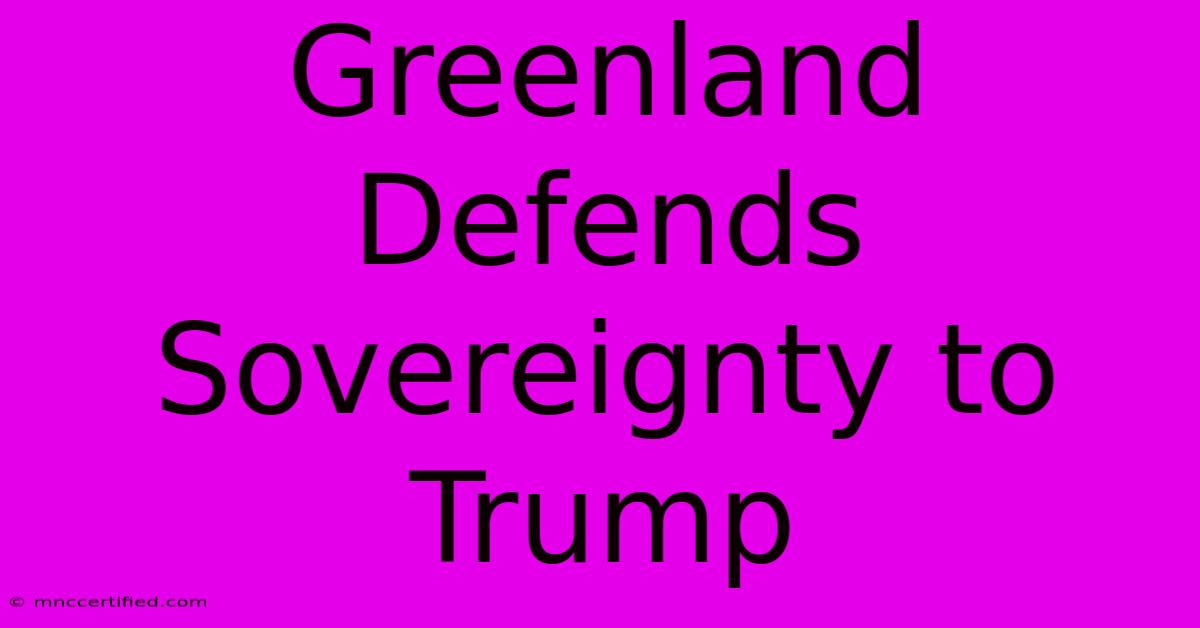Greenland Defends Sovereignty To Trump

Table of Contents
Greenland Defends Sovereignty Amidst Trump's Purchase Offer
In August 2019, then-President Donald Trump's reported interest in purchasing Greenland sent shockwaves across the globe. The proposal, met with widespread bewilderment and dismissal, sparked a crucial conversation about Greenland's sovereignty and its relationship with the United States and Denmark. This article delves into Greenland's resolute defense of its autonomy and explores the geopolitical implications of Trump's unprecedented overture.
Greenland's Firm Stance: Self-Determination and Sovereignty
Greenland, a self-governing country within the Kingdom of Denmark, possesses a unique political status. While Denmark handles foreign affairs and defense, Greenland manages its internal affairs, including its natural resources. Greenland's unwavering commitment to self-determination was clearly demonstrated in the immediate and unequivocal rejection of Trump's proposal.
The Prime Minister of Greenland, at the time, swiftly and firmly dismissed the idea, emphasizing Greenland's status as a non-negotiable entity. This rejection wasn't merely a political maneuver; it reflected a deep-seated commitment to maintaining its own path and preserving its cultural identity. Greenland's stance underscored the importance of respecting the self-determination of nations, particularly those with a history of colonial influence.
Beyond the Headlines: The Deeper Significance
The incident transcended a simple political proposal. It highlighted the crucial issues of:
- National Identity: The rejection of Trump's offer underscored Greenland's strong sense of national identity and its desire to chart its own course.
- Resource Management: Greenland possesses significant natural resources, including minerals and potential offshore oil and gas reserves. Control over these resources is paramount to Greenland's economic development and future. The proposed purchase suggested a disregard for Greenland's right to manage its own wealth.
- Geopolitical Implications: The incident highlighted the complex geopolitical landscape of the Arctic region and the growing interest of global powers in the area's resources and strategic location. Trump's proposal was seen by many as an attempt to assert US influence in the Arctic, potentially at the expense of Greenland's autonomy.
The US-Greenland-Denmark Relationship: A Delicate Balance
The incident strained, albeit temporarily, the relationship between the US, Greenland, and Denmark. While Denmark maintains a close alliance with the US, the Trump administration's actions were seen by many in Denmark as disrespectful and undermining of Greenland's sovereignty.
The incident, however, also spurred a renewed focus on strengthening the relationship between Greenland and Denmark. This reinforced the importance of respecting Greenland's autonomous status within the Kingdom of Denmark.
Strategic Importance of the Arctic
The Arctic region is increasingly important strategically and economically. Its melting ice cap opens up new shipping routes and access to resources. This increased interest from various global powers necessitates a careful balancing act to safeguard Greenland’s sovereignty and its sustainable development.
Conclusion: Sovereignty and the Future of Greenland
Greenland's strong and unequivocal rejection of Trump's proposal solidified its commitment to self-determination. The incident served as a stark reminder of the importance of respecting the sovereignty of nations and the delicate geopolitical balance in the Arctic region. Greenland's future, shaped by its own choices and priorities, remains a significant factor in the evolving Arctic landscape. The episode highlighted the growing global interest in the Arctic and the need for international cooperation to ensure its sustainable development and respect for the rights of its inhabitants.
Keywords: Greenland, Trump, Sovereignty, Self-determination, Arctic, Denmark, US, Geopolitics, Resources, National Identity, Purchase offer, Greenlandic sovereignty, Arctic sovereignty, Trump Greenland purchase.

Thank you for visiting our website wich cover about Greenland Defends Sovereignty To Trump. We hope the information provided has been useful to you. Feel free to contact us if you have any questions or need further assistance. See you next time and dont miss to bookmark.
Featured Posts
-
2024 Game Recap Packers 34 Saints 0
Dec 24, 2024
-
Death Of Burt Crocodile Dundees Croc
Dec 24, 2024
-
Nfl Moves Cowboys Vs Eagles To 1 Pm
Dec 24, 2024
-
Clintons Hospital Stay Fever Doing Well
Dec 24, 2024
-
Dundees Crocodile Star Dead At 90
Dec 24, 2024